 Petzlover
Petzlover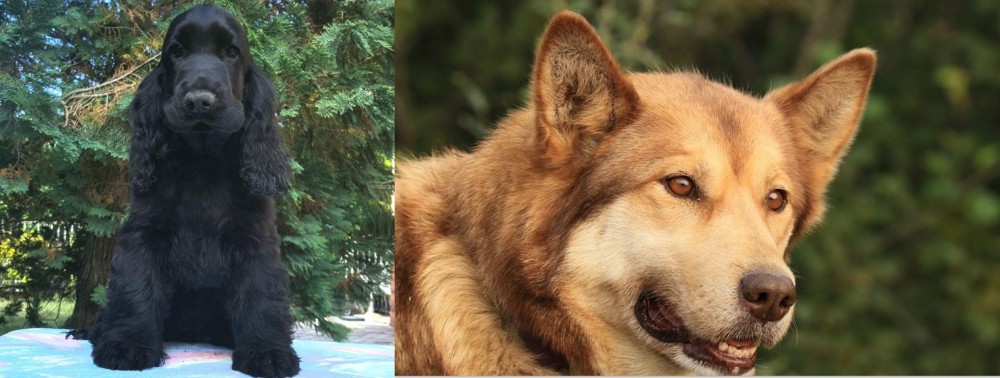 American Cocker Spaniel is originated from United States but Seppala Siberian Sleddog is originated from Canada. American Cocker Spaniel may grow 18 cm / 7 inches shorter than Seppala Siberian Sleddog. American Cocker Spaniel may weigh 9 kg / 19 pounds lesser than Seppala Siberian Sleddog. Both American Cocker Spaniel and Seppala Siberian Sleddog has same life span. Both American Cocker Spaniel and Seppala Siberian Sleddog has almost same litter size. Both American Cocker Spaniel and Seppala Siberian Sleddog requires Moderate Maintenance.
American Cocker Spaniel is originated from United States but Seppala Siberian Sleddog is originated from Canada. American Cocker Spaniel may grow 18 cm / 7 inches shorter than Seppala Siberian Sleddog. American Cocker Spaniel may weigh 9 kg / 19 pounds lesser than Seppala Siberian Sleddog. Both American Cocker Spaniel and Seppala Siberian Sleddog has same life span. Both American Cocker Spaniel and Seppala Siberian Sleddog has almost same litter size. Both American Cocker Spaniel and Seppala Siberian Sleddog requires Moderate Maintenance.
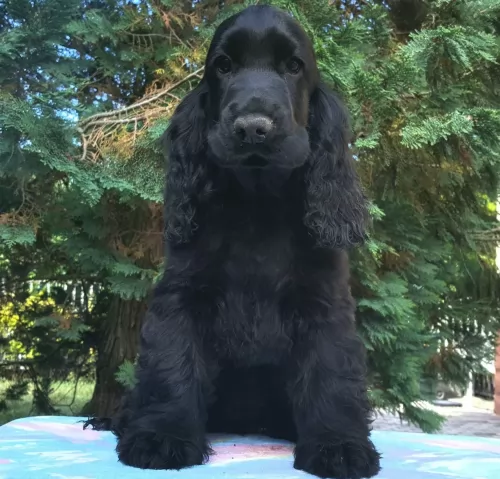 Descended from the English Cocker Spaniel when the latter were brought to the United States in the late 1800s. American hunters wanted a smaller dog for bird hunting, so they crossed them with smaller spaniel breeds. The English and the American Cockers were considered the same breed until 1935 when the American Kennel Club officially separated them into 2 distinct breeds. After this the American Cocker’s popularity increased dramatically.
To this day they are one of the most popular breeds in the U.S. Recently their popularity has spread back to England. The American Cocker Spaniel has evolved from a hunting dog life to a very popular family pet.
Descended from the English Cocker Spaniel when the latter were brought to the United States in the late 1800s. American hunters wanted a smaller dog for bird hunting, so they crossed them with smaller spaniel breeds. The English and the American Cockers were considered the same breed until 1935 when the American Kennel Club officially separated them into 2 distinct breeds. After this the American Cocker’s popularity increased dramatically.
To this day they are one of the most popular breeds in the U.S. Recently their popularity has spread back to England. The American Cocker Spaniel has evolved from a hunting dog life to a very popular family pet.
 This is a rare working dog breed whose job it has been to pull sleds. The Seppala Siberian Sleddog hails from Canada and was regarded as the same dog breed as the Siberian Husky.There is the International Seppala Siberian Sleddog Club which works to preserve this amazing dog as a working breed.
This is a rare working dog breed whose job it has been to pull sleds. The Seppala Siberian Sleddog hails from Canada and was regarded as the same dog breed as the Siberian Husky.There is the International Seppala Siberian Sleddog Club which works to preserve this amazing dog as a working breed.
It was during the 1990s that the breed was recognized as a new breed. In 2002 the Seppala Siberian Sleddog lines found their way to the USA .
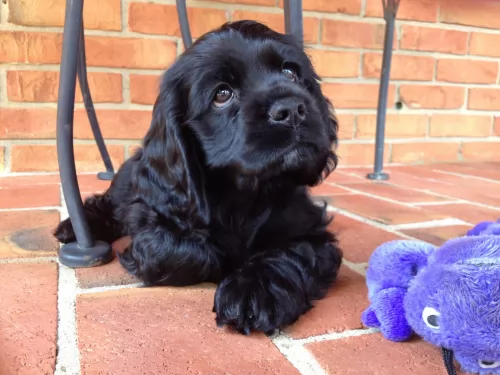 The American Cocker spaniel is a sturdy dog of medium size. The have a rounded head with a broad and deep muzzle. The jaw is even and square while the teeth have a scissors bite. The American Cocker has round eyes that are almost always dark with the exception of the Merle who can have blue colored eyes. They have long ears and a docked tail in the U.S. Docking is illegal in most of Europe. The American Cocker bred for field hunts have shorter coats than those bred for show. Grooming is essential for this longhaired breed. It is especially important for the eyes and ears to be kept clean.
The American Cocker spaniel is a sturdy dog of medium size. The have a rounded head with a broad and deep muzzle. The jaw is even and square while the teeth have a scissors bite. The American Cocker has round eyes that are almost always dark with the exception of the Merle who can have blue colored eyes. They have long ears and a docked tail in the U.S. Docking is illegal in most of Europe. The American Cocker bred for field hunts have shorter coats than those bred for show. Grooming is essential for this longhaired breed. It is especially important for the eyes and ears to be kept clean.
 The Seppala Siberian Sleddog is a medium-sized dog that stands at between 56 to 58cm in height and weighs between 18 to 23kg.
The Seppala Siberian Sleddog is a medium-sized dog that stands at between 56 to 58cm in height and weighs between 18 to 23kg.
It’s a beautiful wolf-like looking dog that used to be the same breed as the Siberian Husky, but it is now considered a separate breed.
The legs of this dog are longer, and they’re slightly more slender and lighter. The ears too, are taller and held very erect. The bushy tail is held high, curving over the back when alert.
The thick coat is medium length and there is also a thick undercoat. Coat colors vary and are wolf-like too - white, cream, grey, black and some reddish rusty colors. Eyes can be blue or brown or the dog can even have one brown eye and one blue.
Because this is an active working breed, he will need some robust exercise. Neglecting this side of him will result in a bored dog that howls a lot.
He is a high energy dog breed and won’t be content with a walk every day. When you go cycling or jogging, you can definitely count him in as he will like nothing more than to run beside you. If you are lucky to live near the beach, a tennis racquet to send the ball flying across the sand will please him no end.
He will need training and socialization of course, and you won’t have trouble training him as he is an intelligent dog. He isn’t the kind of dog that slots easily into life in the city, and will ideally suit a property with large grounds where he can run and play.
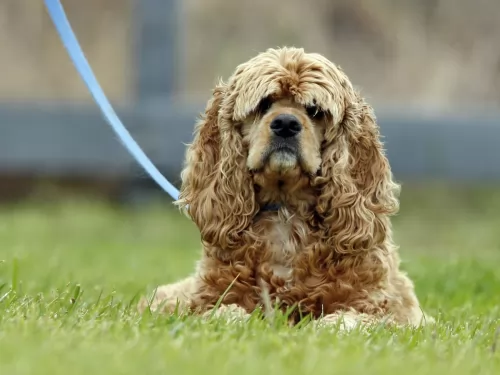 This is a gentle, happy dog. They are high energy, high spirited, friendly dogs who like people and other animals alike. They are happy to be with you and want to please you. He can find a home in the country and in the city alike. He is inquisitive and easy to train.
This is a gentle, happy dog. They are high energy, high spirited, friendly dogs who like people and other animals alike. They are happy to be with you and want to please you. He can find a home in the country and in the city alike. He is inquisitive and easy to train.
But be warned they can be stubborn and hard to housebreak. They can be shy and need a lot of socialization as a pup. They can take over a household if you are not the strong pack leader they need. They have a tendency to urinate when excited and must live inside with the family. They are far too social to be left outside. An unhappy, unstable cocker can be into resource guarding of things, spaces and people. They can bark obsessively or be hyperactive. They must have a loving home with the family.
 The Seppala Siberian Sleddog has always been a working dog so he will need lots of varied forms of exercise. He makes a splendid family pet as he isn’t an aggressive dog.
The Seppala Siberian Sleddog has always been a working dog so he will need lots of varied forms of exercise. He makes a splendid family pet as he isn’t an aggressive dog.
He does however make a good watchdog and will bark and warn you of strangers approaching.These beautiful wolf-like dogs are guaranteed to make you a loving, loyal pet, and they love nothing more than to be close to all his human family.
Treat him as a member of the family and you’ll be rewarded by having his fantastic friendship.
 Perhaps the least of the American Cocker Spaniel’s health concerns are the tendency to overeat and become obese. The more serious concerns include glaucoma, cataracts, dysplasia, allergies, Cherry eye, lip fold pyoderma, liver disease, cardiomyopathy, and congestive heart failure (CHF).
Perhaps the least of the American Cocker Spaniel’s health concerns are the tendency to overeat and become obese. The more serious concerns include glaucoma, cataracts, dysplasia, allergies, Cherry eye, lip fold pyoderma, liver disease, cardiomyopathy, and congestive heart failure (CHF).
The most serious health issue the breed faces is IMHA or Immune Mediated Hemolytic Anemia which can be deadly. In fact, it is almost always fatal and comes on quickly. With this condition the dog can bleed out internally and there is little that veterinary medicine can do.
 The Seppala Siberian Sleddog, just like most other dogs, can suffer from any one of the common dog ailments there are. These illnesses are cancer, hip dysplasia and eye disease.
The Seppala Siberian Sleddog, just like most other dogs, can suffer from any one of the common dog ailments there are. These illnesses are cancer, hip dysplasia and eye disease.
You are more than likely not to see any of these illnesses with your pet, but it’s being a responsible dog owner to be aware of them and to get your pet to the vet if necessary.
Cataracts are an imperfection in the lens of the dog’s eye. The lens should be clear, but a cataract can start off small and then grow much larger, causing blindness in the dog. Cataracts happen when the cells are damaged, and diabetes can cause cataracts as can exposure to ultraviolet light. It is also an hereditary disease.
Most times dogs with cataracts can still see, but in the event of mature cataracts, your canine friend can undergo surgery to remove them.
This is another common dog disease. It can be painful for dogs, with either one or both hips being affected. Hip dysplasia can affect both young and old dogs. It can be sad seeing your active pet becoming reluctant to play. He may also have difficulty getting up from a lying down position.
There is treatment for hip dysplasia, and you will want to make sure your pet is as mobile and pain free as possible.
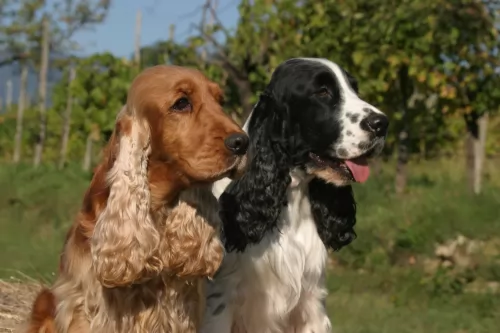 The American Cocker Spaniel breed requires attention to detail and making sure your puppy gets enough and your adult doesn’t get too much. Feed the pups twice a day until they reach the age of 4 months and then cut them back to the adult dose of once a day at supper time. Feed from a cup to a cup and a half.
The American Cocker Spaniel breed requires attention to detail and making sure your puppy gets enough and your adult doesn’t get too much. Feed the pups twice a day until they reach the age of 4 months and then cut them back to the adult dose of once a day at supper time. Feed from a cup to a cup and a half.
not previously mentioned include Ectropion and Entropion, Prolapse of the nicititans gland, gastric torsion and elbow dysplasia. Have your puppy tested for eye diseases and any issues with the knee and hip. These are social dogs and will not do well alone outside. They need to live inside.
The American Cockers love to play and need a lot of exercise. Nice long walks, games of fetch or even agility will keep your Cocker happy. have plenty of stamina and need regular exercise. They also enjoy a good hunt.
 The thick coat of the Seppala Siberian Sleddog will need to be brushed at least twice a week. The coat sheds heavily a couple of times a year and brushing may even be necessary once a day during this heavier shedding period.
The thick coat of the Seppala Siberian Sleddog will need to be brushed at least twice a week. The coat sheds heavily a couple of times a year and brushing may even be necessary once a day during this heavier shedding period.
Just like human beings, you can enhance your dog’s health and longevity by giving him the best food there is. Commercially manufactured dog foods, when carefully selected, can be a good, choice and they’re convenient too.
It is advised to try and go for the high quality ones known for their natural, quality ingredients. Always read the labels because you'll be surprised to see how some of the inferior dog brands pack their foods with toxic ingredients.
To provide your Seppala with just a bit of variety in his diet, give him some home-made food. It can be added into the dry kibble about twice a week as a treat. Boil brown rice and chicken in a pot and add in sweet potatoes, carrots and spinach. Chop all this up and give it to your dog in small portions.
To avoid skin infections, try to include some raw meat into his diet occasionally. Never leave your pet without a constant source of fresh, cool water